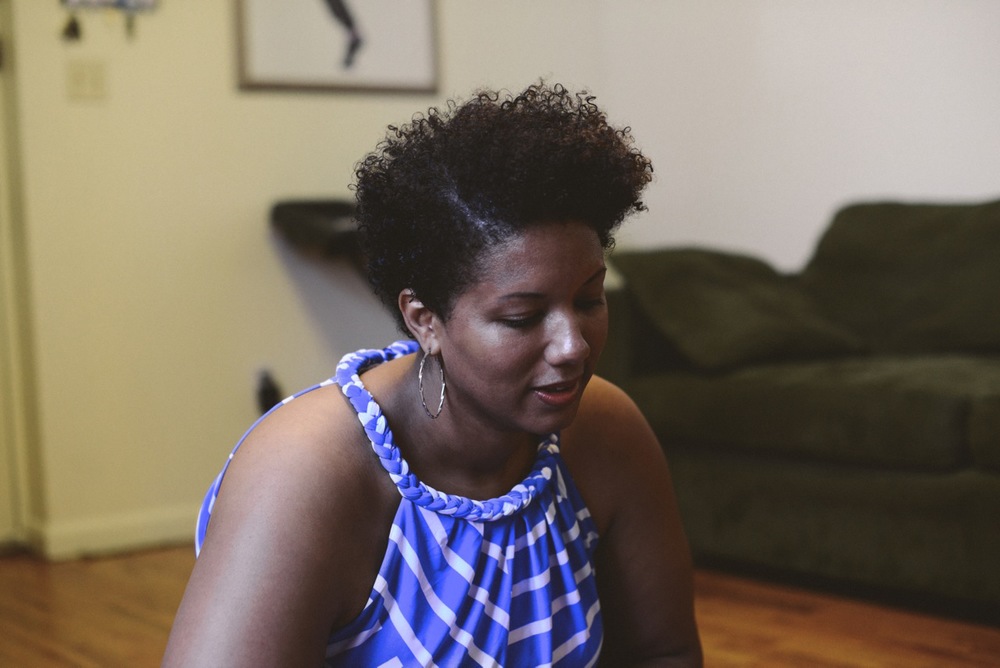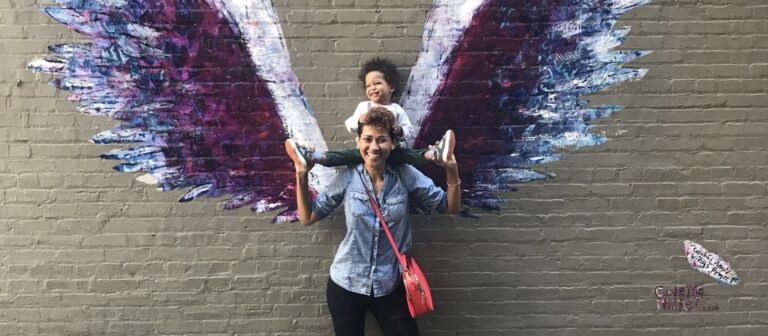Trigger warning: Stillbirth
Bringing life into the world sometimes ends in loss, a reality that is often shushed away in many discussions of motherhood. It’s too sad, the world seems to say. It’s too personal. Better to focus on the joys of motherhood than this unspeakable horror.
But where does that leave the women who experience that loss? So often they are left to feel alone and ashamed for experiencing something that is actually very common: By some estimates, one in four pregnancies will end in a miscarriage, and one in 160 are stillbirths. That loneliness only compounds the grief of losing a baby.
October is National Pregnancy and Infant Loss Month, an event that brings awareness and build community for losses that are felt year round and for a lifetime. This week we’ll be sharing the stories of women who know that pain—women like mater mea Role Mama Takiema Bunche-Smith.
Takiema Bunche-Smith is an educator based in Brooklyn, New York. When she found out she was pregnant in 2003, she and her husband David were overjoyed and immediately started preparing for baby Nazir’s arrival.
But, as she shares with us below, that happiness turned to grief toward the end of her pregnancy.

I had my baby shower when I was 34 weeks.
[At] 37 weeks I started feeling strange for a few days. I had a midwife’s appointment, and I called and said, “I don’t feel right. Something feels weird.”
I asked to come in earlier, and when I went in she couldn’t find the heartbeat. So she said, “I’m going to send you over to the hospital for a sonogram, maybe the baby just moved in a weird position.”
I went there and they couldn’t find the heartbeat. I was 37 weeks, 2 days pregnant… They knew that he had died, so I had to give birth to him on that day, December 2, 2003.
It’s the only kind of death where you experience life and then death inside of you.
[Nazir] was beautiful. He looked like a sleeping angel. He looked like a combination of me and my husband, and I remember his feet. I told my husband, “Thank God he got my feet.” We laugh-cried. Like, we’re so happy to see our baby, we love you, we’ve been waiting for you, and, Oh my God, open your eyes. How can this be reality? It was literally alternating between smiles and sobs.
Bittersweet doesn’t even begin to cover it. It’s a very difficult thing that lives with you for the rest of your life. It’s the only kind of death where you experience life and then death inside of you.
What you have is your hopes and your dreams and your sense of your child’s spirit. And so to have that go, and not have a chance to explore it… To have to give birth and have no baby, and to [be] postpartum…
There are not any words for that.
Over time I realized that I wanted to be a mother to a living child so badly that I was willing to take the risk of this happening again. When the thought of not having another child was more terrifying to me than trying to get pregnant and potentially losing another pregnancy, I knew I was ready to try again.

When I got pregnant the second time in 2005 [with Na’im], I became obsessed with reading medical literature [on] stillbirth and pregnancy. I did have some health problems when I went in for the induction. My blood pressure was dangerously high so I had preeclampsia, which can be fatal to both mom and baby. So they [thought it may have been] the preeclampsia [the first time I was pregnant].
Sometimes I would get strong intuitive feelings about whether or not some of the things I was reading related to me. I came across something about blood clotting disorder, so I went to my midwife and I said, “I need you to test me.”
In all the testing that I had after the stillbirth, that was the one thing that I hadn’t been tested for. And ding ding ding, it came up. I have a genetic mutation. One of my genes causes my blood to overclot. When you’re in pregnancy, your blood tends to clot more, but I have a gene that makes my blood clot even more, which prevents nutrients from getting to the baby. It’s also what predisposed me to not having proper blood flow, which led to the preeclampsia.
After that discovery I was co-managed between the midwife and a perinatologist. I was able to deliver Na’im safely, also with an induction, because with the monitoring it came up that at 37 weeks, my blood started looking pretty wonky again.

The depths of my sorrow for losing Nazir were completely paralleled by the heights of my joy for having Na’im. It was the exact opposite, but it was also coupled with grief again. I thought, Remember what happened last time and what you lost? Look how amazing this is. You could have had it twice.
But the joy I felt when I was able to just focus on him being here was incredible.
I still remember that feeling of trying to nurse. It was so hard, but I was like, I don’t even care. We’re going to work it out. You’re here. Oh my God, you pooped, yay! You’re alive!
People always tell moms “Cherish every moment…” Nobody ever has to tell me that.
You don’t get to parent a child that’s died in the same way, but I was more confident in knowing that I parent Nazir through telling his story, and just being who I am as a mom and supporting other moms.
Nazir was a part of our family. More than anything, I think [he] shaped the kind of mother that I am. People always tell moms “Cherish every moment, and pay attention to the small things, because the moment you look up, they’re going to be taller than you…”
Nobody ever has to tell me that.
Even when I’m upset with Na’im and we’re fussing and things aren’t going the way I want, there’s a part of me that’s like, This is such a gift to me, to mother you and to have this experience and to have my house be a wreck right now.
There’s always a small piece of me that says, Thank God. Thank you for being here, thank you for giving me this experience.

















